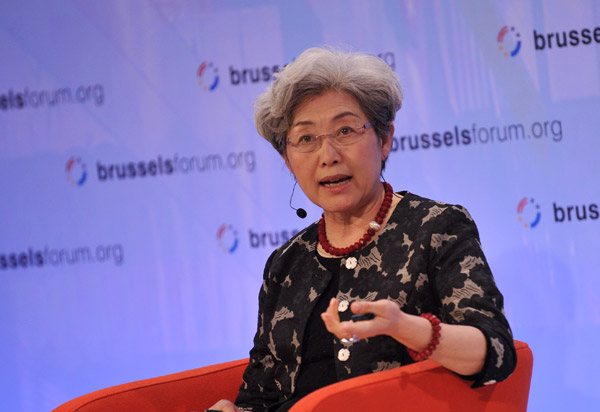China urges ASEAN to be independent
Updated: 2012-06-25 07:38
By Suthichai Yoon (China Daily)
|
||||||||
China has urged members of the Association of Southeast Asian Nations not to be a bystander or "a tool of major powers" to cope with the new challenges in the current global political and economic atmosphere.
 |
|
Fu Ying, Vice-Minister of Foreign Affairs. |
"ASEAN should exercise its independent judgment to move this region forward. If ASEAN takes sides, it would lose its relevance," Vice-Minister of Foreign Affairs Fu Ying told The Nation in an exclusive interview over the weekend.
"ASEAN has an important role to play with its tried-and-true ASEAN Way, as major powers are shaping their new relations in the region."
She said relations with ASEAN countries are of "unquestionable priority" for China. China will continue to support ASEAN's "centrality" in East Asian cooperation, she said.
Fu was in Bangkok over the weekend to meet Thailand's Foreign Affairs Permanent Secretary Sihasak Phuangketkeow. In July, Thailand is to take over the role of ASEAN's coordinator with China for the next three years.
Since the dialogue partnership was established in the early 1990s, ASEAN-China relations have enjoyed robust development, she said.
"We have also encountered a lot of challenges. Yet, rather than hurting our relations, these challenges were turned into opportunities to reinforce our relations," she said.
Asked about the United States' decision to "rebalance" its forces in Asia and the Pacific, Fu said: "China has no problem accepting the US presence and its positive influence in the Asia Pacific. We welcome a constructive US role in regional affairs."
She noted, however, that there is growing concern from media and academics in China over the heavy US emphasis on security in the region.
"I've noticed that the same concern has also been heard in other Asian countries. Some say China is the 'elephant in the room'. Some others worry about a possible return to the Cold War," she said.
"As I see it, maybe it's still too early to draw conclusions."
Asked whether Beijing is concerned about Washington's possible "containment policy" against China, she said: "The US has loudly denied any intention to contain China. We will just take them at their word."
She said she did not believe any country could "contain" another country in the current global environment.
"How can anyone contain 1.3 billion people of China from building better lives for themselves?" she asked.
Fu said China's industrialization is "only halfway" complete. Its huge population means that China's per capita GDP would remain low for a long time to come.
"We are still a developing country working hard to address the imbalances and the uncoordinated and unsustainable aspects of the economy," she said.
Regarding the South China Sea disputes, the vice-minister reiterated that China wants to handle the disputes peacefully through direct negotiations between countries concerned.
"At the same time, we must protect China's sovereignty and maritime rights and interests. We remain committed to working with countries concerned to reach a farsighted and wise solution," she added.
China and ASEAN countries signed the Declaration of Conduct of Parties in the South China Sea in 2002. Central to the DOC is a commitment by all parties to "exercise self-restraint in the conduct of activities that would complicate or escalate disputes and affect peace and stability".
The vice-minister said China and ASEAN are also involved in ongoing discussions on the formulation of a Code of Conduct. "This shows that safeguarding stability in the region and managing disputes appropriately remains the mainstream thinking in our region."
She added: "We sincerely hope that China and ASEAN countries will keep a cool head on this issue and exercise restraint through action, and that all parties will refrain from undermining the atmosphere for peace and stability in the region."
She pointed out that more than 80 percent of China's trade goes through the sea lanes in South China Sea.
"Safety of the navigation routes is of utmost importance for China. We will do all we can to ensure peace in this part of the world," Fu said.
Suthichai Yoon is editor-in-chief of The Nation Group in Bangkok
Contact the writer at yoon@nationgroup.com
Special to China Daily

 Relief reaches isolated village
Relief reaches isolated village
 Rainfall poses new threats to quake-hit region
Rainfall poses new threats to quake-hit region
 Funerals begin for Boston bombing victims
Funerals begin for Boston bombing victims
 Quake takeaway from China's Air Force
Quake takeaway from China's Air Force
 Obama celebrates young inventors at science fair
Obama celebrates young inventors at science fair
 Earth Day marked around the world
Earth Day marked around the world
 Volunteer team helping students find sense of normalcy
Volunteer team helping students find sense of normalcy
 Ethnic groups quick to join rescue efforts
Ethnic groups quick to join rescue efforts
Most Viewed
Editor's Picks

|

|

|

|

|

|
Today's Top News
Health new priority for quake zone
Xi meets US top military officer
Japan's boats driven out of Diaoyu
China mulls online shopping legislation
Bird flu death toll rises to 22
Putin appoints new ambassador to China
Japanese ships blocked from Diaoyu Islands
Inspired by Guan, more Chinese pick up golf
US Weekly

|

|






